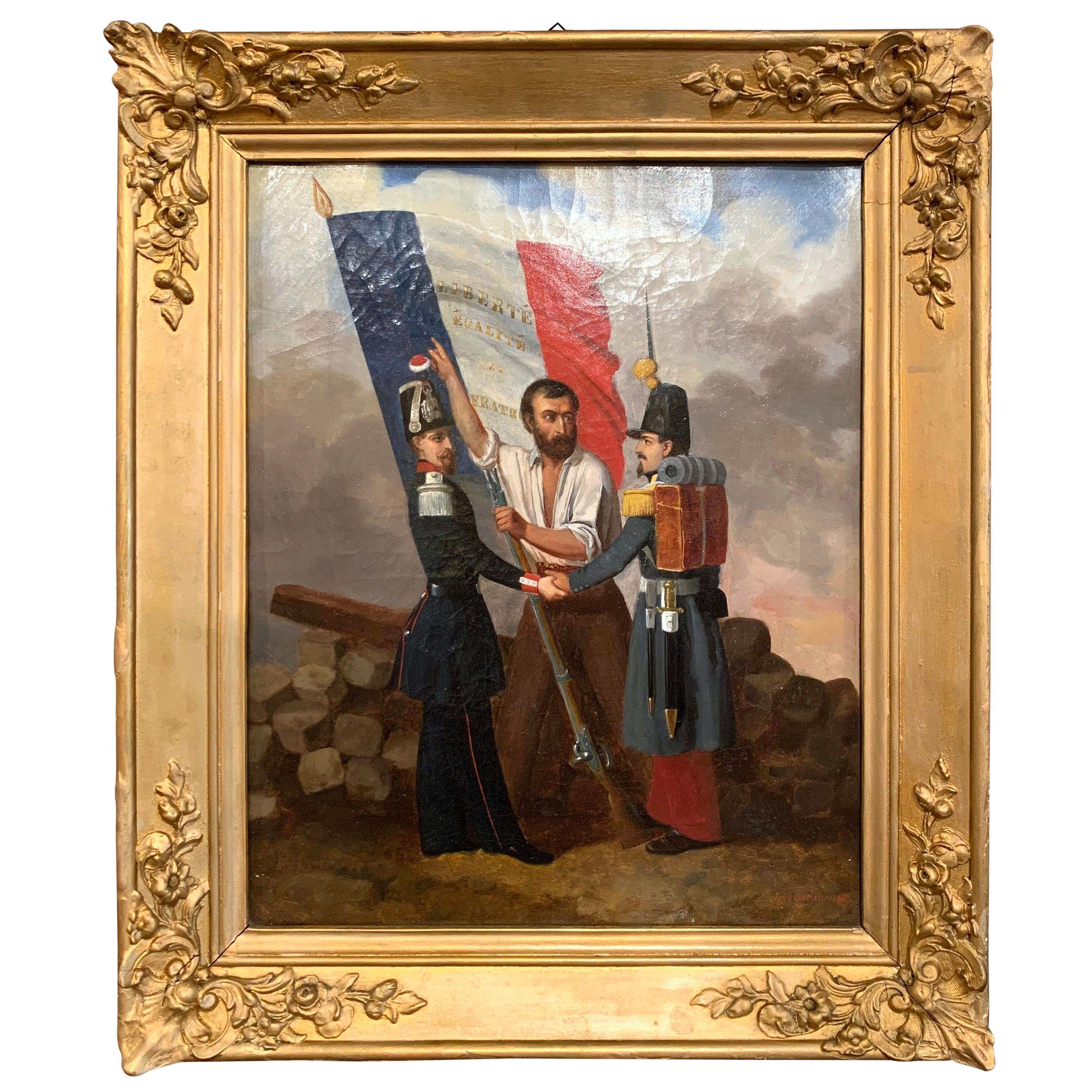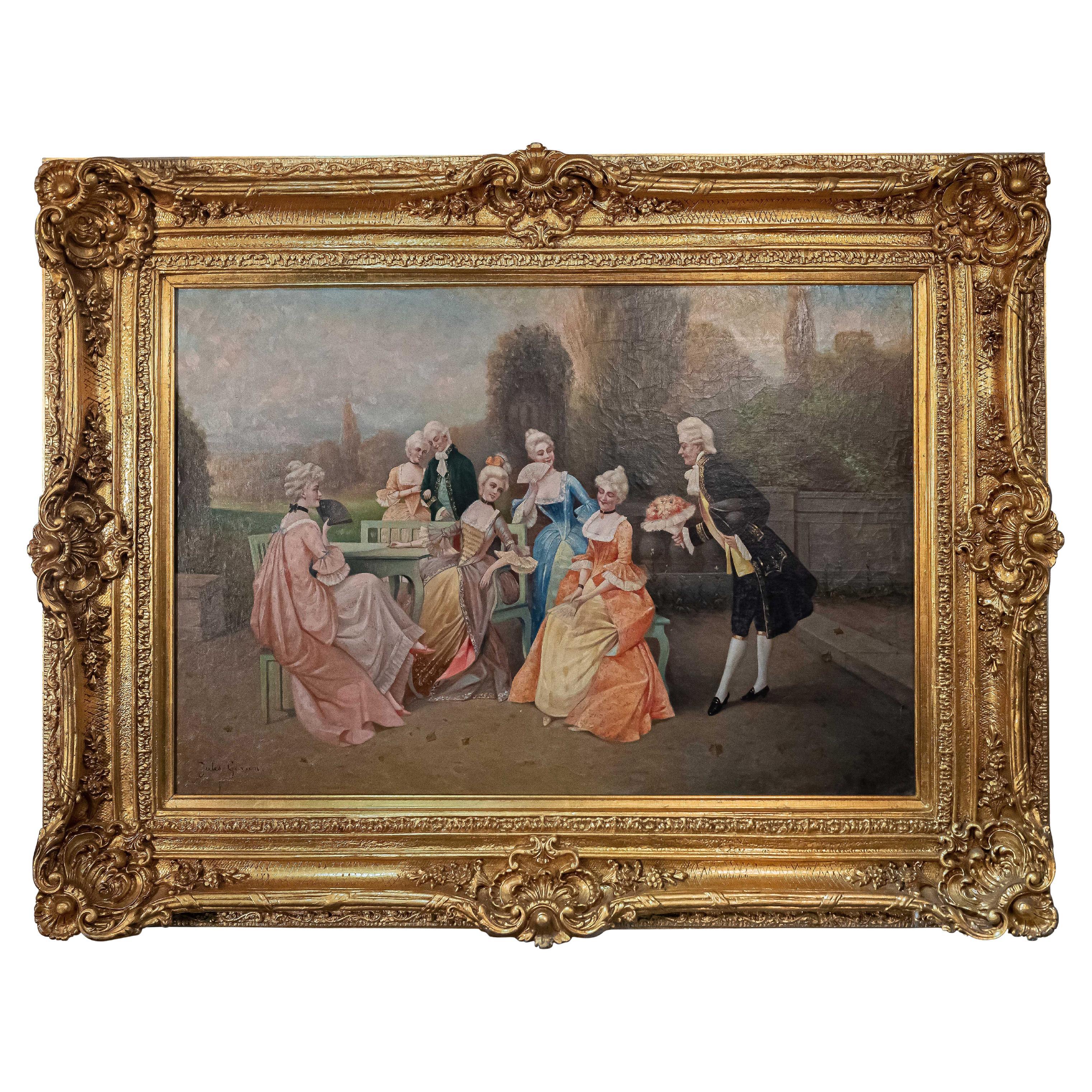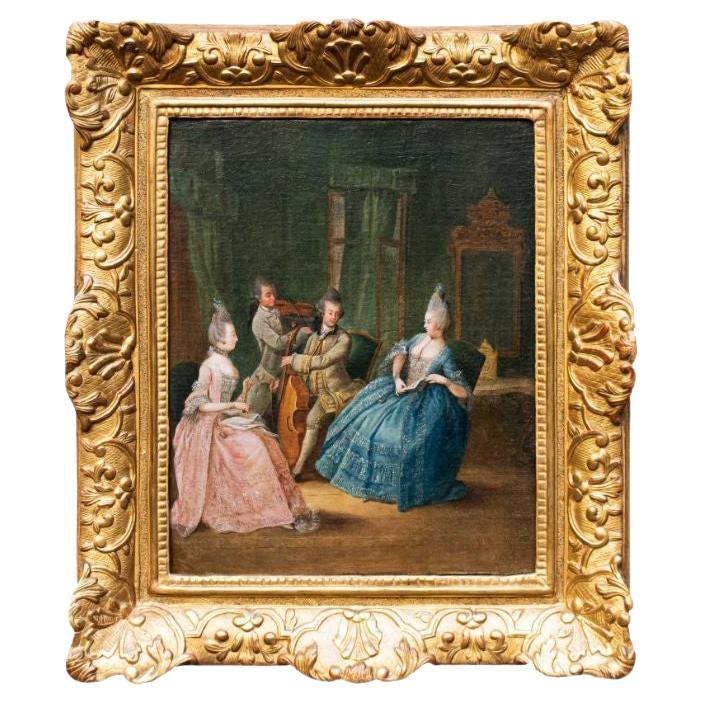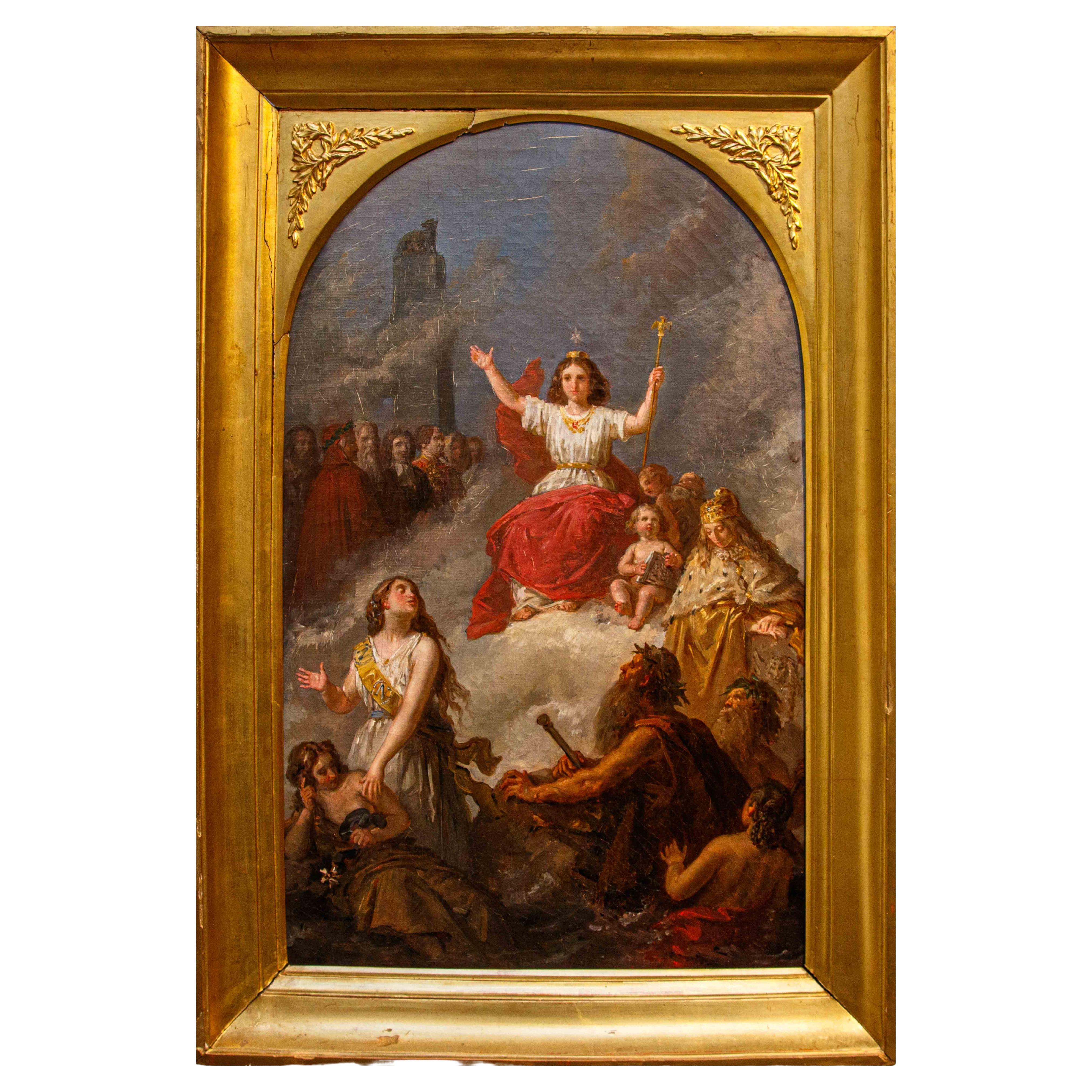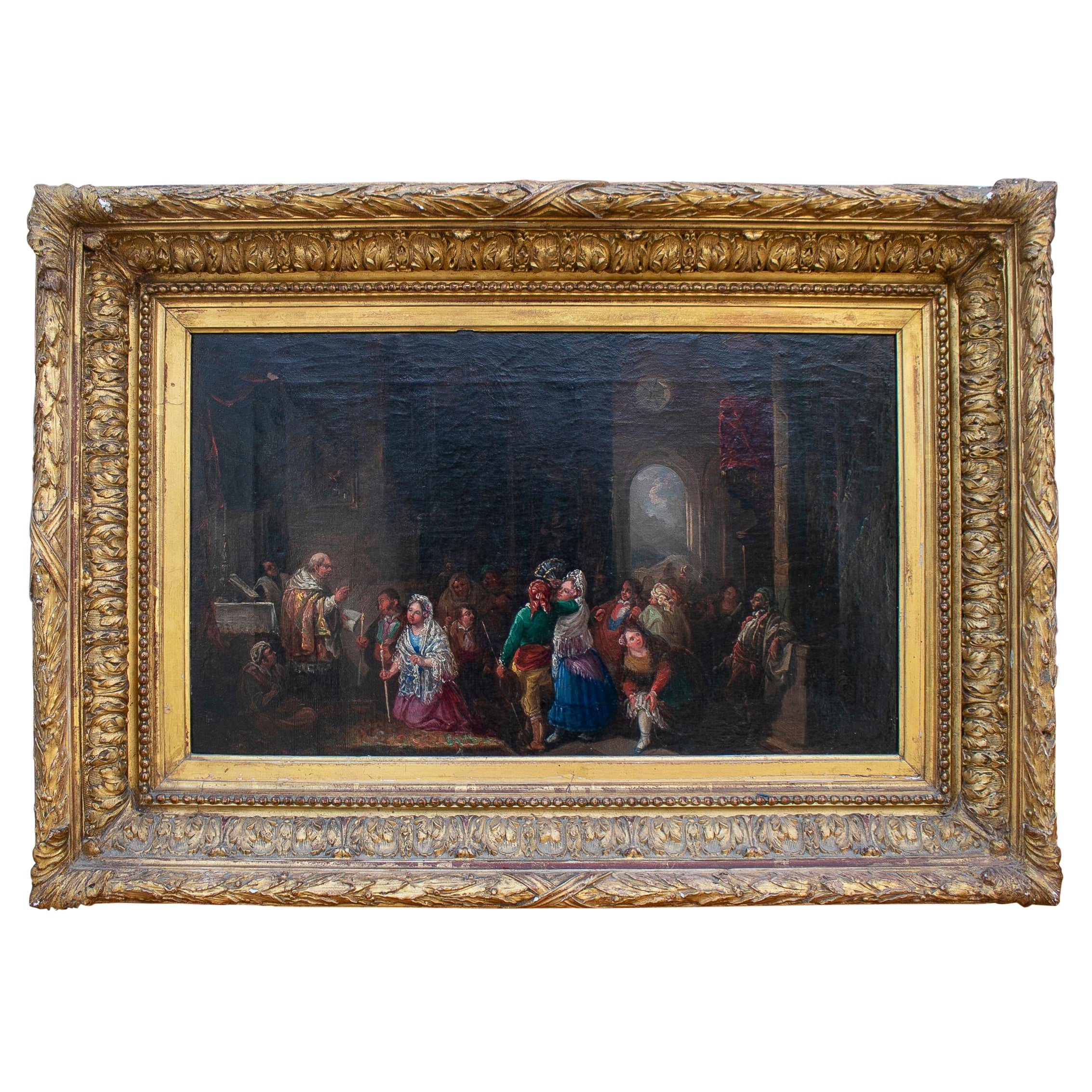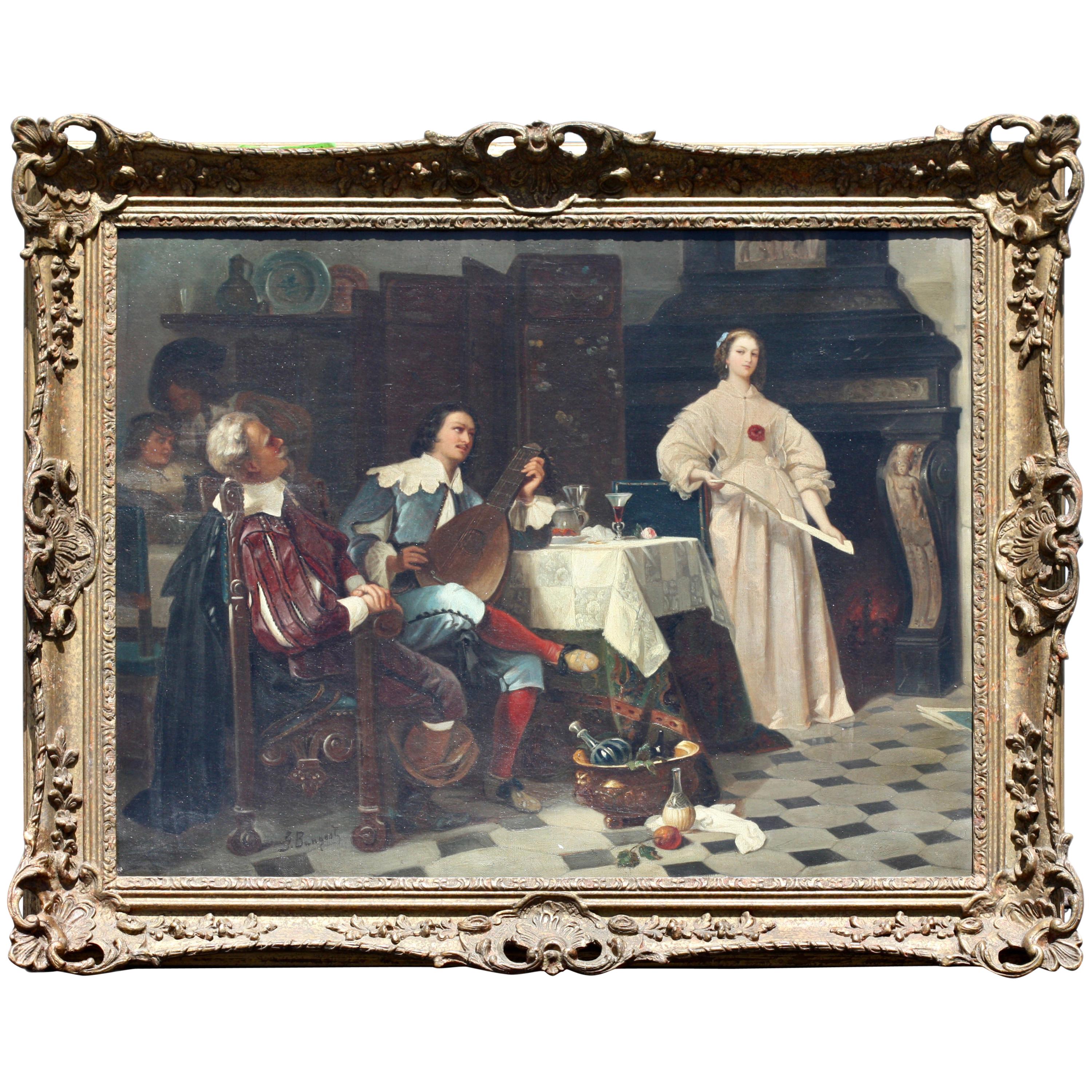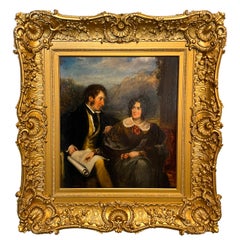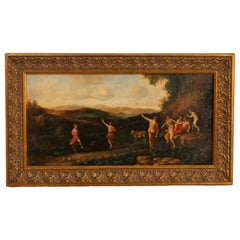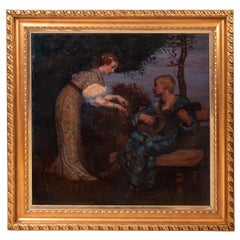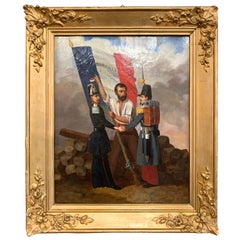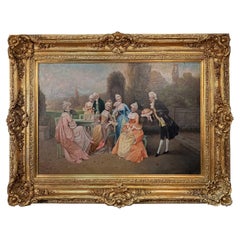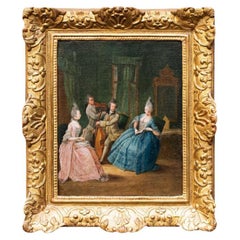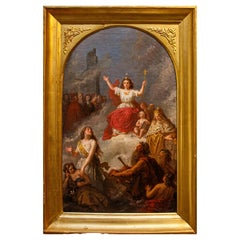Items Similar to Antique French Oil Painting Claude Rouget de LiIsle Singing "La Marseillaise"
Want more images or videos?
Request additional images or videos from the seller
1 of 16
Antique French Oil Painting Claude Rouget de LiIsle Singing "La Marseillaise"circa 1849
circa 1849
$4,995
£3,757.29
€4,330.90
CA$7,036.01
A$7,720.18
CHF 4,040.38
MX$95,009.26
NOK 50,902.76
SEK 47,678.02
DKK 32,338.39
About the Item
A fine antique French oil painting on canvas by Isidore Alexandre Augustin Pils (1815–1875), the painting depicting Claude Joseph Rouget de Lisle (1760-1836) singing "La Marseillaise", circa 1849.
Isidore Pils was an academic painter, very often painting military subjects. Claude Rouget de Lisle was a French army officer from the French Revolutionary Wars and famously wrote the words to "La Marseillaise" and first performed it to the Mayor of Strasbourg; Baron Philippe-Frederic de Dietrich. This painting dates to the middle of the 19th century and could be by the hand of Pils or possibly a talented copyist who was also a classically trained artist, the work appears to be unsigned.
The painting is in excellent condition and is housed in a gilded frame.
Isidore Pils produced a number of paintings with this famous scene and one such painting is housed in the collection of The Louvre in Paris.
At sight without frame 26.50" x 22"
Pils was born in Paris as the son of a soldier François Pils. At the age of twelve, he studied with Guillaume Guillon-Lethière for four years.
In 1831 he became a student at the École des Beaux-Arts and studied under François-Édouard Picot. He competed for the Prix de Rome, which he won in 1838 for a history painting, St. Peter Healing a Lame Man at the Door of the Temple. Although in poor health, Pils then spent the customary three years at the French Academy in Rome at the Villa Medici, which then had Jean Auguste Dominique Ingres as its director. While in Italy he visited Naples, Venice, and Florence.
Pils's earlier paintings have religious themes. In 1849 he completed his most famous work, Rouget de L'Isle Singing La Marseillaise, which now resides at the Musée historique de Strasbourg. After experiences travelling with French troops through the Crimea, his themes took on military and nationalistic subjects. He later produced many military scenes during the siege of Paris during the Franco-Prussian War of 1870.
Pils was appointed professor of painting at the École des Beaux-Arts in 1863 but left the same year for two years in Algeria. In 1868 he was elected to seat #14 of the Académie des Beaux-Arts. Among his students were Adrien Moreau, Paul Adolphe Rajon, Julien Dupré, Luc-Olivier Merson, Ludovic Piette, Édouard Joseph Dantan and László Mednyánszky Henry-Lionel Brioux.
Among his other work, Pils painted part of the ceiling of the grand staircase of the Palais Garnier, in four panels titled The Gods of Olympus, Apollo in His Chariot, Triumph of Harmony, and Apotheosis of the Opera, completed the year of his death. The following year he was the subject of a biography by Louis Becq de Fouquières.
- Attributed to:Isidore Alexandre Augustin Pils (1813 - 1875, French)
- Creation Year:circa 1849
- Dimensions:Height: 27 in (68.58 cm)Width: 31 in (78.74 cm)Depth: 2.5 in (6.35 cm)
- Medium:
- Movement & Style:
- Period:
- Condition:Very good Condition.
- Gallery Location:Portland, OR
- Reference Number:1stDibs: LU1366216198012
About the Seller
5.0
Gold Seller
Premium sellers maintaining a 4.3+ rating and 24-hour response times
Established in 1990
1stDibs seller since 2020
61 sales on 1stDibs
Typical response time: 1 hour
- ShippingRetrieving quote...Shipping from: Portland, OR
- Return Policy
Authenticity Guarantee
In the unlikely event there’s an issue with an item’s authenticity, contact us within 1 year for a full refund. DetailsMoney-Back Guarantee
If your item is not as described, is damaged in transit, or does not arrive, contact us within 7 days for a full refund. Details24-Hour Cancellation
You have a 24-hour grace period in which to reconsider your purchase, with no questions asked.Vetted Professional Sellers
Our world-class sellers must adhere to strict standards for service and quality, maintaining the integrity of our listings.Price-Match Guarantee
If you find that a seller listed the same item for a lower price elsewhere, we’ll match it.Trusted Global Delivery
Our best-in-class carrier network provides specialized shipping options worldwide, including custom delivery.More From This Seller
View AllAntique Oil Painting Aristocratic Portrait of John Ogle Kirkley Hall Northumbria
Located in Portland, OR
An important & fine antique George IV period oil painting; a portrait of John & Sara Ogle of Kirkley Hall Northumbria, England, by Sir John Hayter RA, signed & dated 1829.
Sir John ...
Category
1820s English School Figurative Paintings
Materials
Oil
Antique French War Oil Painting Napoleon With His Army Generals Horse & Carriage
By Raymond Desvarreux
Located in Portland, OR
A fine and important French oil painting of Napoleon & his army, by the French-American artist Raymond Desvarreux (1876-1963), the painting signed & dated 1906.
The painting depicts Napoleon seated in his carriage examining battle plans...
Category
Early 1900s French School Animal Paintings
Materials
Oil, Canvas
Antique 19th Century Neoclassical Bacchanal Painting Dancing of the Nymphs 1850
By Cornelius van Poelenburgh
Located in Portland, OR
A good antique Dutch/Flemish oil on panel painting, after Cornelis van Poelenburgh, circa 1850.
The painting portrays a number of nude and par...
Category
Mid-19th Century Old Masters Figurative Paintings
Materials
Oil, Panel
Large Antique German Oil Canvas Hermann Frobenius Pre-Raphaelite Painting 1900
Located in Portland, OR
A Large and impressive antique oil on canvas Pre-Raphaelite painting by the German artist, Hermann Frobenius (1871-1954), signed and dated 1900.
Frobenius had classical training and studied both in Rome and Florence, he later was in the circle of Arnold Bocklin and Hans von Marees, he settle in Munich but also in Dresden briefly and latterly in Berlin. He, like many other European painters was fascinated with North Africa and painted many oriental scenes of Algiers, Tunis and Cairo, he was represented at many exhibitions, including the "Great German Art Exhibition" in Munich 1941.
This painting (an early example of the artist's work) is very finely painted in the Pre Raphaelite style, depicting a medieval costumed...
Category
Early 1900s Pre-Raphaelite Figurative Paintings
Materials
Canvas, Oil
19th century French Barbizon School Painting oil on Canvas Landscape circa 1840
Located in Portland, OR
19th century French Barbizon School Painting, oil on canvas signed "Marin", Circa 1840. A very attractive bucolic, pastoral landsacpe scene with sheep grazing on the banks of a lake ...
Category
Early 19th Century Barbizon School Landscape Paintings
Materials
Canvas, Oil
Antique French Portrait Miniature Oil Painting Vigee Lebrun Mother Daughter 1860
Located in Portland, OR
Antique French Portrait Miniature oil Painting, Jenny Savy, circa 1860.
The painting being larger than most portrait miniatures and painted by Jenny Savy, a renowned French portrait...
Category
19th Century Figurative Paintings
Materials
Oil
You May Also Like
19th Century Oil on Canvas French Revolution Painting Signed and Dated 1849
Located in Dallas, TX
Set in the original carved giltwood frame, this antique oil on canvas was painted in France, circa 1849, the art work depicts two French soldiers in hard discussion with a man carryi...
Category
Antique Mid-19th Century French Paintings
Materials
Canvas, Giltwood
Large 19th Century French Oil on Canvas by Jules Garson
Located in Los Angeles, CA
A 19th century French oil painting on canvas depicting classical figures in landscape, with a standing gentleman presenting bouquet of flowers to a sitting lady.
Signed: Jules Garson...
Category
Antique Late 19th Century French Paintings
Materials
Canvas
18th Century Concert scene Painting Oil on Canvas by Daniel Nikolaus Chodowiecki
Located in Milan, IT
Daniel Nikolaus Chodowiecki (Danzig, 1726 - Berlin, 1801)
Interior scene with concert
Oil on canvas, 42 X 34 cm
With frame 57 x 49 x 6 cm
Already attributed to Pietro Longhi, the ...
Category
Antique Mid-18th Century German Paintings
Materials
Canvas
painting depicting Allegory of Italy, Oil on canvas, 19th century
Located in Milan, IT
19thC
Allegory of Italy
Oil on canvas 64 x 40
Framed, 73 x 50 cm
During the 19th century, the fervent Italian cultural climate dominated by the aspiration for an Italy finally un...
Category
Antique 19th Century Paintings
Materials
Canvas
19th Century Oil on Canvas Painting Attributed to Eugenio Lucas Villamamil
Located in Marbella, ES
Antique 19th century oil on canvas people painting attributed to Eugenio Lucas Villamamil, with acanthus and foliate gilt wood and gesso frame
Dimensi...
Category
Antique 19th Century Spanish Paintings
Materials
Canvas
Belgian School, 19th Century Oil on canvas "A musical interlude"
Located in West Palm Beach, FL
Belgian School, 19th century
Oil on canvas
"A musical interlude"
Signed (lower left)
Measures: 21 x 27 1/8 in (53.3 x 68.8cm).
Category
Antique 19th Century Paintings
Materials
Canvas
More Ways To Browse
Musee De Louvre
Gilded Age Paintings
Antique Staircase
Middle Temple
Siege Antique
Medici Villa
19th Century Oil Paintings Religious
Franco Prussian
Franco Prussian War
1849 Painting
Auguste Jean
19th Century Military Oil Paintings
L Moreau
Francois Moreau
Italian Art Antique Painted Religious
Francois Guillaume
Antique Military Painting
Revolutionary War Antique
